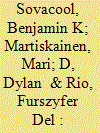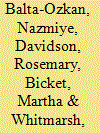|
|
|
Sort Order |
|
|
|
Items / Page
|
|
|
|
|
|
|
| Srl | Item |
| 1 |
ID:
125411


|
|
|
|
|
| Publication |
2013.
|
| Summary/Abstract |
Dynamic pricing is being discussed as one method of demand side management (DSM) which could be crucial for integrating more renewable energy sources into the electricity system. At the same time, there have been very few analyses of consumer preferences in this regard: Which type of pricing program are consumers most likely to choose and why? This paper sheds some light on these issues based on two empirical studies from Germany: (1) A questionnaire study including a conjoint analysis-design and (2) A field experiment with test-residents of a smart home laboratory. The results show that consumers are open to dynamic pricing, but prefer simple programs to complex and highly dynamic ones; smart home technologies including demand automation are seen as a prerequisite for DSM. The study provides some indications that consumers might be more willing to accept more dynamic pricing programs if they have the chance to experience in practice how these can be managed in everyday life. At the same time, the individual and societal advantages of such programs are not obvious to consumers. For this reason, any market roll-out will need to be accompanied by convincing communication and information campaigns to ensure that these advantages are perceived.
|
|
|
|
|
|
|
|
|
|
|
|
|
|
|
|
| 2 |
ID:
178835


|
|
|
|
|
| Summary/Abstract |
In this empirical study, we explore the user acceptance of smart home technologies by asking: How do people perceive their opportunities and drawbacks? What factors shape their perceptions? What implications does this have for future energy savings, sustainability, and policy? Based on a mixed methods approach involving three focus groups (N = 18) and a nationally representative survey of adults (N = 1032) in the United Kingdom, we explore the demographics, preferences, and risks of smart home technology. We do this via the lenses of knowledge and adoption; energy and climate sustainability; and vulnerability and exclusion. We explore how different classes of people—adopters versus non-adopters, high-income versus low-income, women and men, old versus young—support or oppose smart home technologies, have different degrees of knowledge and misperceptions, and reveal very different perceptions about the practices enabled by smart homes. In doing so, we show at times compelling links between smart homes and energy consumption, and possible negative impacts to poverty, inclusion, and empowerment.
|
|
|
|
|
|
|
|
|
|
|
|
|
|
|
|
| 3 |
ID:
126513


|
|
|
|
|
| Publication |
2013.
|
| Summary/Abstract |
The aim of this paper is to explore social barriers to the adoption of smart homes through the analysis of expert views and public attitudes. Smart home services aim to improve the comfort, convenience and safety of householders, as well as allowing them to use energy more efficiently and cope with increasing costs. Despite the existence of smart homes and smart home technologies for some time, their prevalence is not widespread, and thus their potential largely untapped. Using a combination of in-depth deliberative public workshops, expert interviews and a review of the existing literature, this paper explores social barriers to smart home diffusion, including how these vary by expertise, life-stage and location. The research highlights the importance of barriers such as control, security, and cost, providing insights for policymakers as well as smart-home designers and developers as to how these might be addressed.
|
|
|
|
|
|
|
|
|
|
|
|
|
|
|
|
|
|
|
|
|